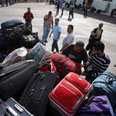
Experts analyze opening of Rafah crossing
Major-General (res.) Giora Eiland believes there are political advantages to opening of Rafah crossing while former Shin Bet chief Avi Dichter claims status of Egyptian policy is more important
ecurity experts and academics are convinced the opening of the Rafah border crossing on Saturday has some positive aspects. Israel must focus on creating international pressure which would force the new regime in Cairo to tighten cooperation with Israel, they say.
"It's actually good for the State of Israel in the long run," says Ido Zelkovitz, an expert on Palestinian society and politics at the Haifa University. "If Egypt opens the crossing, Israel will supposedly no longer be responsible for supplying Gaza's daily needs and Egypt will become the official gateway," he explained.
Major-General (res.) Giora Eiland, former National Security Council head, says that the opening of the crossing serves Israel's interests and should not be opposed to as "Israel is accused of placing Gaza under siege which legitimizes actions against us such as the Turkish flotillas."
Former Shin Bet chief MK Avi Dichter (Kadima) believes that the issue of the opening of the border is less important than the smuggling phenomenon. "What's important is not whether the crossing is open or not, but whether the Egyptian policy has changed," he explained. "If there is a change then we have a problem on our hands regardless if the border is open or not."
Palestinian bus crossing the border (Photo: AFP)
"Sadly, Egypt's record in the smuggling of arms and terrorists into Gaza is very bad as far as Israel is concerned," MK Dichter says, "Egypt's efforts on this score varied from doing nothing to very little."
He adds, "It really depends on how the Egyptians treat the people passing there and their cargo." If Cairo continues to operate in the same manner, he says, arms will be smuggled through the tunnels and not via the crossing.
"If they open the crossing and let anyone pass, there won't be much of a difference as far as we're concerned. We need to ask ourselves what's the Egyptian policy along the Philadelphi Route and not what their policy is in the Rafah crossing itself."
Meanwhile, Zelkovitz believes that Egypt will share information it obtains in the crossing with Israel. "The opening of the border should be considered an opportunity and not a risk," he says.
Eiland proposes that Israel claim that the Gaza Strip should no longer be considered under a blockade now that the border is open.
"If we knew how to leverage this in the international arena, it could have its advantages. Claiming that opening the border would cause weapons smuggling is utter nonsense as Egypt effectively decides what goes in and out. And therefore if smugglings are being allowed now, an open border will not change that. If Egypt doesn’t want certain goods or people to enter, they can prevent it with the crossing. "
Eiland further claims that in a security perspective no damage has been caused and that there is even an advantage on the political level.
He claims that the reason the border has been closed until now was because Israel and the Palestinian Authority opposed it being opened.
"We argued that the PA must control the border and that Hamas cannot hold political contacts with Egypt, and effectively fought the PA's battle. Occasionally, what's good for your enemy is also good for you, and vice versa."
- Follow Ynetnews on Facebook











